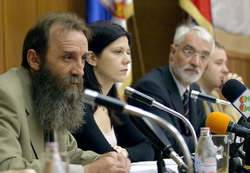- Serbia
Get to know Serbia
- Citizens
Culture and science
Health services
Pension and disability insurance
- Business
Employment
Economy
- Media
- Government
- Contact
Keep in touch
Contact form
Back
Keepin touch
Whether you have a question, comment, suggestion or any problem in the purview of the government, send us your message and we will try to respond as soon as possible. If your problem is not in our purview, we will forward your message to the relevant institution.
Q:
A:
European Integrations Committee adopts National Strategy for EU Accession
Belgrade,
12 July 2005
The European Integrations Committee in the National Assembly of the Republic of Serbia adopted today Serbia’s National Strategy for the Accession of Serbia and Montenegro to the European Union.
Serbian Deputy Prime Minister Miroljub Labus, Chairman of the National Assembly Predrag Markovic, Head of the OSCE Mission to Serbia and Montenegro Maurizio Massari, officials of the European Commission and the Embassy of Great Britain, as the country which is presiding over the EU, attended the committee’s session.
Labus expressed hope at the session that the stabilisation and association talks will begin on October 5, and added that the holding of the Montenegrin referendum would have a direct influence on the deadline of the agreement signing.
He said that Montenegro has the right to hold a referendum, but that the possible postponement of signing the stabilisation and association agreement would have a negative affect on Serbian state interests. According to him, due to the uncertainty regarding the referendum in Montenegro, the manner of negotiating with the EU will probably be different than with other countries.
The Serbian Deputy Minister stated that, in the case of Serbia-Montenegro, talks could commence over technical and commercial issues, and later, after the future of the state union is better known, they would address political issues.
Labus pointed out that all conditions for the beginning of EU talks have been met, namely the cooperation with the Hague tribunal, the intensive work of the National Assembly, changes to the Constitutional Charter of the state union of Serbia-Montenegro, work on the protection of human and minority rights, as well as the upgrading of the government administration.
He pointed out that the signing of the agreement with the EU will not be possible without the adoption of the new Constitution of Serbia, and added that all political parties should take this seriously.
Labus stated that by September, before the commencement of negotiations with the EU, the formed working groups will create individual platforms and reiterated that the negotiations could be over in nine months, although it is a race with many obstacles.
The Chairman of the National Assembly of the Republic of Serbia Predrag Markovic said that the Assembly has a great deal of work to do and added that the National Assembly will play the key role in the EU accession process, due to the numerous laws that must be adopted.
European Integrations Committee members praised the strategy, and added that Serbia should adopt the strategy for social and economic development, improve regional cooperation, achieve a consensus on the most significant state and national affairs, and improve the provisions on small and medium-sized enterprises.
Labus expressed hope at the session that the stabilisation and association talks will begin on October 5, and added that the holding of the Montenegrin referendum would have a direct influence on the deadline of the agreement signing.
He said that Montenegro has the right to hold a referendum, but that the possible postponement of signing the stabilisation and association agreement would have a negative affect on Serbian state interests. According to him, due to the uncertainty regarding the referendum in Montenegro, the manner of negotiating with the EU will probably be different than with other countries.
The Serbian Deputy Minister stated that, in the case of Serbia-Montenegro, talks could commence over technical and commercial issues, and later, after the future of the state union is better known, they would address political issues.
Labus pointed out that all conditions for the beginning of EU talks have been met, namely the cooperation with the Hague tribunal, the intensive work of the National Assembly, changes to the Constitutional Charter of the state union of Serbia-Montenegro, work on the protection of human and minority rights, as well as the upgrading of the government administration.
He pointed out that the signing of the agreement with the EU will not be possible without the adoption of the new Constitution of Serbia, and added that all political parties should take this seriously.
Labus stated that by September, before the commencement of negotiations with the EU, the formed working groups will create individual platforms and reiterated that the negotiations could be over in nine months, although it is a race with many obstacles.
The Chairman of the National Assembly of the Republic of Serbia Predrag Markovic said that the Assembly has a great deal of work to do and added that the National Assembly will play the key role in the EU accession process, due to the numerous laws that must be adopted.
European Integrations Committee members praised the strategy, and added that Serbia should adopt the strategy for social and economic development, improve regional cooperation, achieve a consensus on the most significant state and national affairs, and improve the provisions on small and medium-sized enterprises.
-
 Belgrade, 4 January 2026
Belgrade, 4 January 2026Violation of UN Charter has become dominant principle of contemporary politics
-
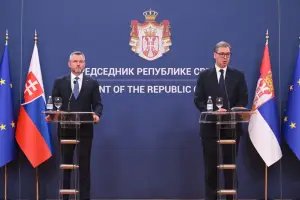 Belgrade, 21 December 2025
Belgrade, 21 December 2025Strengthening cooperation with Slovakia in many areas
-
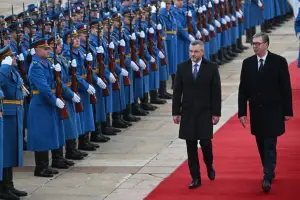 Belgrade, 21 December 2025
Belgrade, 21 December 2025President of Slovakia ceremonially welcomed in front of Palace of Serbia
-
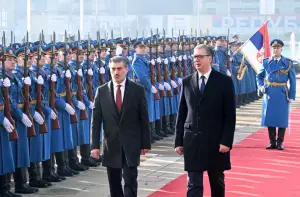 Belgrade, 18 December 2025
Belgrade, 18 December 2025Vučić welcomes President of Georgia in front of Palace of Serbia
-
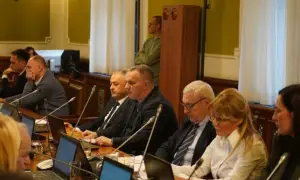 Belgrade, 15 December 2025
Belgrade, 15 December 2025Serbia needs strong, stable education system
-
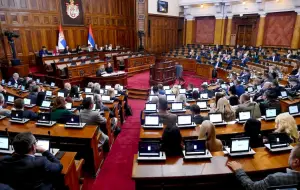 Belgrade, 3 December 2025
Belgrade, 3 December 2025Parliament adopts 2026 budget
-
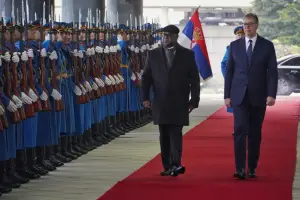 Belgrade, 28 November 2025
Belgrade, 28 November 2025Serbian President welcomes President of DR Congo
-
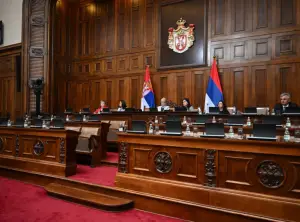 Belgrade, 7 November 2025
Belgrade, 7 November 2025Parliament adopts multiple laws
-
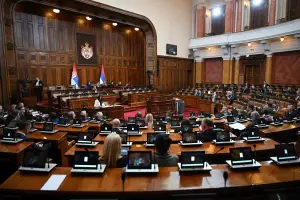 Belgrade, 22 October 2025
Belgrade, 22 October 2025Parliament adopts several laws, ratifies multiple international agreements
-
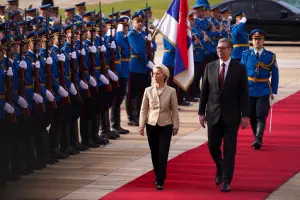 Belgrade, 15 October 2025
Belgrade, 15 October 2025Vučić welcomes Ursula von der Leyen in front of Palace of Serbia

